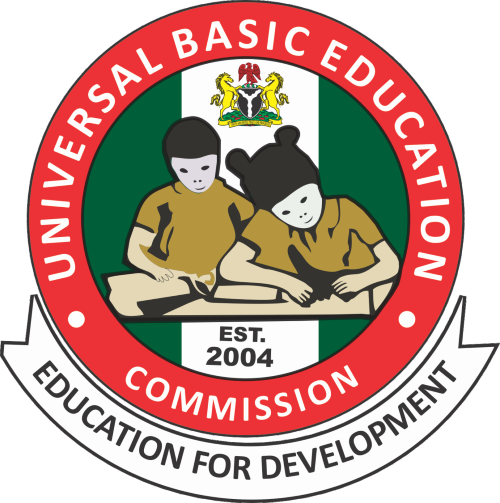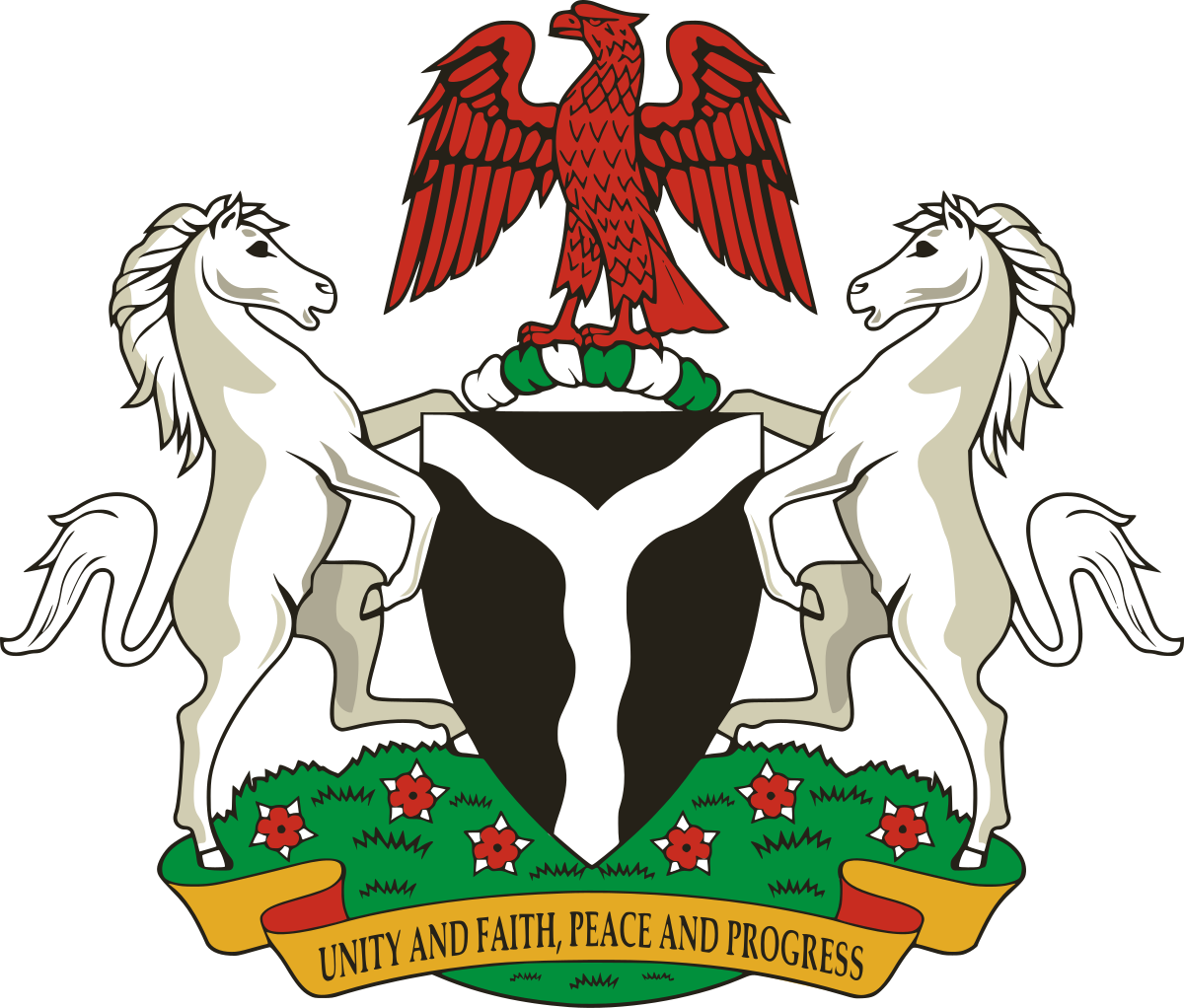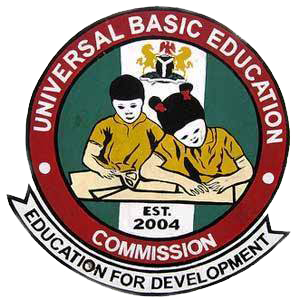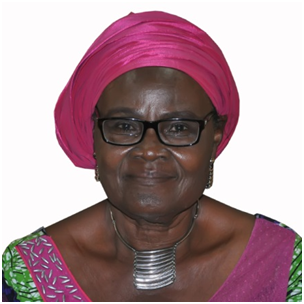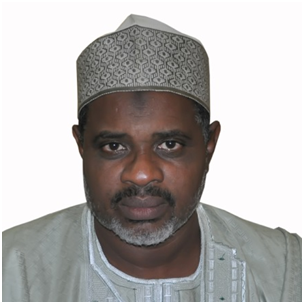
Dr. Ossom Ossom
Ag. Director, Department of Social Mobilization
DEPARTMENT OF SOCIAL MOBILIZATION
Ossom Mmah Ossom is a result-driven education expert with keen interest in utilizing his professional skills towards enhancing the attainment of educationally related components of the Sustainable Development Goals (SDGs). He holds a 2nd-Class Upper Division, Bachelor of Arts degree in Communication Arts and Fine Arts, (August 1990), from the University of Cross River State (now University of Uyo),
Nigeria; a Master‟s Degree in Public Administration (Human Resource
Management), (May 2011), from the National Open University of Nigeria (NOUN), Abuja, Nigeria; a Masters’ degree in Educational Planning and Management, (June 2012), from the International Institute for Educational Planning (IIEP), Paris, France, and a Doctorate degree in Educational Administration and Planning from the Nasarawa State University, Keffi, Nasarawa State, Nigeria, October 2019.
Ossom started his professional career in 1990, after his first degree, serving in various media/creative capacities in the Public Relations and Advertising industry. He joined the services of UBEC in June 2002 as a Senior Social Mobilization Officer in the Department of Social Mobilization. He rose within the ranks in the Department to the position of Chief Social Mobilization Officer before being reassigned as Head of UBEC Public Relations and Protocol Unit in 2014. In October 2014, he was designated as Coordinator, UBEC Sub-Zonal Office, Abuja and served in that capacity till February 2015 when he, once again, was and Protocol Unit. His second stint as UBEC spokesman ended in November 22, 2020 following his appointment, by God‟s grace, as Acting Director, Department of Social Mobilization, effective November 23, 2020.
Dr. Ossom is married and he and his wife are blessed with children. He loves reading, visiting and exploring life-long learning opportunities in other terrains and derives pleasure in serving and mentoring. He is an advocate of the institutionalization of best practices in education system administration and is committed to utilizing the social mobilization and effective communication platforms in making fundamental contributions to the successful execution of priority educational interventions in developing nations. reappointed Head of UBEC Public Relations
INTRODUCTION
The Social Mobilization Department is saddled with, among other responsibilities, carrying out mass mobilization, advocacy and sensitization of the general public, forging partnerships with stakeholders in basic education as well as disseminating various messages of the UBE programme to the general public. This is aimed at increasing awareness, community empowerment, ownership and participation of stakeholders to achieve the overall objectives of the compulsory, free universal basic education in Nigeria.
DEPARTMENTAL STRUCTURE
The Department as at December, 2020, had seven (7) Units with their corresponding Sections as follows:
FUNCTIONS OF THE DEPARTMENT
The Department carries out a number of specific functions aimed at achieving the overall objectives of the Commission.
These are:
- initiating Social Mobilization programmes especially as they relate to:
- advocacy, sensitization and mobilization for effective and quality basic education delivery;
- community empowerment through Self-Help projects and mobilization to promote access, enrolment, improvement and ownership of the UBE programme;
- initiating programmes aimed at mainstreaming Out-of-School Children into basic education schools;
- orientating stakeholders on understanding the Commission‟s policies and programmes and their responsibilities in supporting and ensuring the success of the programmes;
- initiating contacts and programmes for broadening network of partnerships with CSOs and other stakeholders at the grassroots level for resources mobilization, participation on proactive implementation, monitoring and evaluating of the basic education delivery processes;
- promoting new sets of attitudes and culture for the attainment of the goals and objectives of the UBE programme as well as the spirit of dignity in labour, honesty and commitment to qualitative basic education;
- encouraging formal and non-formal education through public enlightenment activities, publications, etc.;
- liaising with other Departments in UBEC and other MDAs for effective mobilization on the implementation of all basic education related programmes e.g. Girl-Child Education, Education of Street Children, the Disadvantaged Children and the Home Grown School Feeding and Health Programme, etc;
- liaising with and coordinating the efforts of sister education agencies such as NTI, NERDC, NCCE, NABTEB, ADNF, etc, Local and International Development Partners (IDPs) and NGOs in the design, production and distribution of public enlightenment materials on UBE;
- encouraging and promoting the formation and establishment of Community Based Organizations in support of UBEC such as School Based Management Committees (SBMCs);
- initiating National, State and Community-based school enrolment campaigns;
- initiating intervention programmes for North-East Education Reconstruction Initiative;
- initiating and implementing programmes such as HIV/AIDS Awareness Campaign and capacity building for States, LGAs and communities/schools;
- researching into monitoring and evaluating advocacy and mobilization strategies; and
- carrying out any other activities that may be assigned to the Department.
ACCOMPLISHED ACTIVITIES
Community Empowerment and Development School-Based Management Committee – School Improvement Programme (SBMCSIP)
SBMC-SIP encourages community participation and ownership of schools. The Commission. through the programme, disburses funds directly to SBMCs for the improvement of infrastructure, learning materials and equipment in schools. The overall import is to increase access to education, qualitative education and achieving equity in the provision of Basic Education in Nigeria.
The Unit carried out the under listed activities during the year under review:
- Disbursed the 1st tranche support funds under the Micro, Macro and Special Cases projects to 2,461 school/communities.
- Organized SBMC workshop to train Master Trainers on SBMC using the SBMC Guidelines, SBMC trainers Manual, Mentoring and Monitoring Pack and SBMC-SIP Implementation Manual.
- Cascaded the SBMC training at State level to selected beneficiary schools and LGEA SBMC Desk officers.
- Conducted Mid-term monitoring to SBMC-SIP beneficiary schools to ascertain 75% and above project execution/implementation for second tranche payment.
- Disbursed 25% support funds to selected SBMC-SIP beneficiary schools that were recommended for payment after Mid-term monitoring in the 36 States and FCT.
- Conducted final monitoring of all SBMC-SIP beneficiary schools to determine the level of project completion.
Inclusive Education
Special Needs Education
The Special Needs Education is one of the key programmes of the Commission aimed at bridging the education gap between children with psycho-social, mental or physical challenges in basic education delivery. The Commission supports states and private providers to ensure that children with special needs acquire basic education and are adequately catered for, irrespective of their psycho-physical conditions.
The following activities were carried out under this sub-programme during the period under review:
- Verified information of private providers of education for children with special needs that applied for 2018 support fund;
- Facilitated the disbursement of 2018 Special Needs Education support fund to eligible SUBEBs; and
- Facilitated the disbursement of the first and second tranche of funds to the eligible schools/centres from the 2018 Special Needs Education intervention Fund.
Open Schooling Programme (OSP)
The Open Schooling Programme is instituted to promote enrolment, retention and completion of basic education in a flexible education system that allows learners learn in a conducive local learning environment at an agreed time with the community away from the conventional schooling system using Information and Communication Technology tools.
The under listed activities were carried out in OSP during the year under review:
- Organized a 2-day preparatory meeting of stakeholders comprising SUBEB Chairmen representing the six (6) Pilot States, Content Developers and Center Managers to acquaint them on their expected roles and responsibilities.
- Organized a 5-day training for Content Developers and Center Managers on Open School Programme.


Dr. Tony Mays making a presentation Alh. Bello Kagara, the former Director of the Department and Dr. Tony Mays at the Workshop
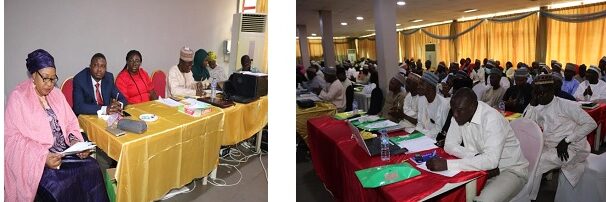
Some UBEC members of staff Participants listening with rapt attention present at the Workshop during the Workshop
Rapid Response Initiative
- Commenced Content Development for the Open Schooling Programme.
- Conducted virtual meetings between Federal Ministry of Education, Content Developers, Center Mangers, UBEC and Commonwealth of Learning (COL) to map out strategies in implementing the programme due to the COVID 19 pandemic.
Enrolment Drive
The Department organized a three-day capacity building workshop for UBEC‟s Social Mobilization Officers and SUBEBs‟ Enrolment Drive Desk Officers in the 36 States and FCT.
Public-Private Partnership
To continuously enhance stakeholder partnerships in UBE delivery, the Commission has established partnerships with different NGOs, the Organized Private Sector and line Ministries interested in supporting basic education delivery. The Unit has accomplished the under-listed activities:
- Recommended support for the implementation of some programmes initiated by different stakeholders intervening in basic education delivery such as:
- Access to Humanitarian Assistance and Development Initiative (AHDI),
- Africa Support and Empowerment Initiative,
- National Association of the Blind (NAB); and
- I Am The Future of Nigeria Youth Initiative;
- initiated partnership arrangements with Organized Private Sector; and
- initiated the development of a framework on stakeholder engagement in Basic Education delivery.
ON-GOING ACTIVITIES
The Department is engaged in the following on-going projects:
School-Based Management Committee-School Improvement Programme (SBMC-SIP)
- Subsequent disbursement of funds to 2017/2018 selected beneficiary schools that were later recommended for payment after monitoring of project execution.
- Preparation and commencement of 2019 SBMC-SIP activities for the year 2020.
Public and Private Partnership
- Development of Framework on Public and Private Partnership andStakeholders‟ engagement in basic education delivery.
- Engagement with Public and Private Partnership stakeholders‟ to further strengthen synergy among stakeholders.
Awareness and Buy-in-Strategies
- Completion of Zonal Enrolment Drive in outstanding States.
FUTURE ACTIVITIES
The following activities are planned for accomplishment in the future:
School-Based Management Committee-School Improvement Programme (SBMC-SIP)
- Conduct of training of Master Trainers (UBEC/SUBEB officials and SBMC-SIP Desk Officers) on project implementation to build their capacity to cascade same at the State level.
- Advocacy and sensitization of grassroot stakeholders on SBMC-SIP project concept, selection and implementation procedures.
- Verification of schools selected for the 2019 projects that are in dire need of the SBMC-SIP intervention in each State.
- Disbursement of project implementation support funds to SUBEBs and LGEAs.
- Cluster Based Training of the Project Implementation Sub-Committees (PISCs) of each selected beneficiary school/community under the 2019 SBMC-SIP programme implementation.
- Official flag-off of 2019 SBMC-SIP activities.
- Disbursement of the 1st and 2nd tranche of project implementation support funds to beneficiary school/community under the 2019 SBMC-SIP programme implementation.
- Conduct of the Mid-Term monitoring of the 2019 SBMC-SIP projects.
- Conduct of the final monitoring of the 2019 SBMC-SIP projects.
- Completion, certification and utilization of all 2019 SBMC-SIP projects.
Public and Private Partnership (PPP)
- Meeting with various categories of stakeholders.
- Presentation of draft Framework for general stakeholder input,
- Presentation of Final draft of the Framework for criticism/editing. Printing of Partnership Framework and distribution to partners.
- Development of PPP Trainers‟ Guide.
- Training of Trainers (key stakeholder representatives) on the implementation of Framework.
- Implementation of PPP activities to ensure continuity and evidence-based result.
- Supervision, reportage and documentation of PPP Report.
- Presentation and publication of stakeholder collective roles in basic education.
- Recognition and Award to major player.
Awareness and Buy-in-Strategies. Enrolment Drive Campaigns
- Strengthening UBE Zonal and State offices engaged in the delivery of basic education.
- Strengthening synergy between UBEC, SUBEB and stakeholders in tackling the issues of access to basic education.
- Continuous sensitization of the public on the inherent benefits of basic education.
- High level Advocacy visit to States on out-of-school children.
- Collaboration meetings with the media for the broadcast and dissemination of UBE activities.
Open School Programme
- Organizing round table meeting to initiate engagement with IDPs on Open Schooling Programme.
- Organizing a workshop on development of OSP framework and monitoring template.
- Validating existing OSP centres in each of the 6 pilot states.
- Organizing a workshop with National Board for Technical Education (NBTE) and other stakeholders to critique monitoring template.
Effective School
Development of a Draft Framework on Effective School. Organizing a meeting with stakeholders.
Production and Media
Production of enlightenment materials and posters on SBMC and Out-ofSchool Children.
CHALLENGES
The following challenges were faced by the Department, during the year, in the discharge of its functions:
- Prevailing societal negative attitude and cultural inhibitions on formal education/schooling (especially on the girl-child in the Northern Nigeria).
- Weak and uncomplimentary stakeholder participation on matters of Basic Education delivery.
- Weak partnership and support from States on matters of UBE delivery.
- Insufficient on-the-job institutional capacity building and general training for staff of Social Mobilization Department.

